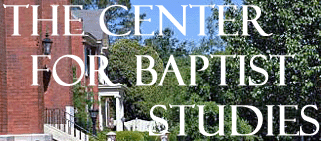|
Encouraging scholarship, strengthening faith identity, and interpreting contemporary issues in Baptist life. |
||
 |
|
Resources: |
|
Home • Staff • Local Church • News & Views • Issues • Bulletin • Conferences / Seminars • Sabbaticals • Certificate • Links |
||
|
"Minutes of the Philadelphia Baptist Association" by Walter B. Shurden Callaway Professor of Christianity Executive Director, The Center for Baptist Studies Mercer University, Macon, Georgia During the eighteenth-century in America, the Philadelphia Baptist Association was the single most important institution in Baptist denominational life. From 1707, the date of its founding, to 1814, the Philadelphia Baptist Association served essentially as a national convention for Baptists in this country. The association, the first of its kind in America, was so prominent in its influence on later Baptist associations that historians have come to refer to "the Philadelphia tradition." For those reasons--its singular importance in the eighteenth-century and its lasting influence on Baptist life in America--the Minutes of the Philadelphia Baptist Association,edited by A. D. Gillette and published in 1851 by the American Baptist Publication Society, is a classic of Baptist history in America. Fortunately, the Baptist Book Trust of Otisville, Michigan (48463) reprinted this invaluable book in 1976. It is one of the many "must" books for any Baptist history collection and for anyone serious about knowing the background and development of Baptists in America. Why should "minutes" of an association be considered a classic? To be sure, it is not a classic in the sense of literary elegance and excellence. As the title indicates, it consists of Minutes of the Philadelphia Association. Few, if any, "minutes" of any organization belong to the category of literary beauty. These are no exception. In the early years the minutes were sketchy, poorly compiled, yet still invaluable as documentation of early eighteenth-century Baptist life. However, after Morgan Edwards, the first Baptist historian in America, comes on the associational scene in 1761, the records of the association assume more order, detail, professionalism, and historical value. These records, however, never reached the lofty heights of literary brilliance or profound historical ideas. Again, then, why label it a classic? The Concerns of Baptists in the Eighteenth Century The Minutes of the Philadelphia Baptist Association is a classic because it provides insight into the elementary concerns of Baptist churches and people in eighteenth-century America. When organized in 1707, the Philadelphia Association was to be composed of the "most capable in every congregation" and to meet yearly "to consult about such things as were wanting in the churches, and to set them in order." What was "wanting" in the churches? What needed to be "set in order"? A careful chronological reading of the Minutes reveal the evolutionary preoccupations of Baptists in their second century of existence in America. It is easy for us today to read later affections back into Baptist history. For example, one does not find in the first fifty years of the Minutes any reference to "missions" as we know the term today. The "foreign missions" movement did not begin until very late in the century (William Carey and 1792) and the records of the Philadelphia Association clearly reflect that fact. To say, as one often hears at Baptist meetings, that "Baptists have always been a missionary people" is to overlook the fact that at one time Baptists were concerned with survival, not expansion. The Philadelphia Minutes reflect a Baptist people and Baptist churches struggling to find their way in the world. The churches were small. In 1761, over fifty years after the founding of the association, the association consisted of twenty-nine churches, the three largest of which had 134, 110, and 104 members respectively. Nineteen of the twenty-eight churches had less than fifty members! Twenty-five of the twenty-eight churches had less than 100 members! When one thinks of Baptists today, especially of Baptists in the South, one thinks "big." Such thinking skews one’s effort to understand early Baptists in this country. In addition to being small, the churches possessed limited ministerial leadership. They had even fewer educated ministers or laity. Doubtless, this is why the churches wanted the "most capable in every congregation" to represent them in the yearly association of churches. Religious education of any kind in the churches was limited primarily to the sermons of the preacher, the reading of the Bible, and the few books or pamphlets available. All of this is to say that the early Baptist churches in America needed each other! They needed each other in ways that Baptist churches today, with their access to information and education, can hardly imagine. Therefore, in its first half-century the Philadelphia Association addressed itself to the things that were "wanting" in the churches. What was "wanting" were answers to questions regarding baptism, ordination, church disputes, and theological issues. The association virtually served as a "Baptist Bishop," always functioning, however, in an advisory rather than judicial or legislative manner. While the churches needed each other to advise them regarding their "queries," they were "wanting" even more in securing and sustaining a preaching ministry. The Minutes are replete with laments regarding "the scarcity of ministers." Churches were encouraged "to make inquiry among themselves, if they have any young persons hopeful for the ministry, and inclinable to learning." The churches were encouraged to "call out the called." While ministerial scarcity was one problem, ministerial "imposters" posed another threat. The association advised churches to take precautions in the certification of ministers. Deviant minister in belief and practice were "advertised" to the churches, a potent weapon of social control in early Baptist life. To help regulate, and in a very real sense to "standardize", the churches and the ministry in faith and practice, the Philadelphia Association issued in 1742 the Second London Confession of Faith and a document on church discipline. In the first half of the eighteenth-century the Philadelphia Association focused on the needs of the churches and the ministry. In the last half of the century, it turned more toward becoming a voice for ministerial education, religious liberty, and missions, and in that order. To say it another way, in the first half of the century, the churches appealed to the association to aid the churches with their internal problems. In the latter part of the century the association appealed to the churches to work together through the association to accomplish externally what the churches could not do in isolation. The Authority and Power of Associations The Minutes of the Philadelphia Baptist Association is also a classic because it contributes enormously to our understanding of the very knotty problem of Baptist church polity or church government. How much power does an association of churches have? What authority does it possess it relation to a local church? These questions were not only inevitable for Baptists; they remain to the present day as we debate polity issues. To answer the questions, you must look not only at what Baptists said but also what they did. Theory must be tested by practice. Moreover, to answer the questions fully one would have to investigate all Baptist associations of the eighteenth-century. However, the Minutes of Philadelphia provide helpful insight into the questions. In 1749 the association asked Benjamin Griffith to write "an essay on the power and duty of an Association of churches." The formally stated intent of the essay revealed the fact that, like the doctrine of the trinity, this issue of polity was easier to state than to resolve The purpose of the essay was to identify "what power an Association of churches hath, and what duty is incumbent on an Association; and prevent the contempt with which some are ready to treat such an assembly, and also to prevent any future generation from claiming more power than they ought—lording over the churches." Translated, Griffith said that an association has certain duties, so it should have certain respect, but deference to the association did not mean domination over the churches. Griffith made at least three significant points in his essay about an association. First, and this is what he began with, the association "is not a superior judicature," having power over the churches. Rather, "each particular church hath a complete power and authority from Jesus Christ, to administer all gospel ordinances,...to receive in and cast out, and also to try and ordain their own officers, and to exercise every part of gospel discipline and church government, independent of any other church or assembly whatever." Later in the essay Griffith echoed this theme for emphasis, saying that the association has no "superintendency over the churches" but rather was "subservient to the churches." Baptist church government has often been described as a process of checks and balances. Baptists, however, have been primarily interested in "checks." Extensive reading in the Minutes of the Philadelphia Baptist Association and in other eighteenth-century associational documents is not required to convince one that Baptists were far more interested in the freedom of the local church than they were in extending the powers of the associated body. Most associational documents spent for more time indicating what an association could not do than clearly stating what it could do. Griffith leans in that direction as well, but he also wanted his readers to know what power an association had. Second, while the association cannot "lord it over the churches," the association was, just as a local congregation, an independent and self-governing body. This meant that the association could and should "withdraw" from churches or individuals "defective in doctrine and practice." Griffith went further, however. To "withdraw" from deviant churches was a negative power. The association, said Griffith, also has the positive power "to exclude" a defective or disorderly church from the association. In other words, an association had the right and responsibility to determine its membership in the same manner as a local church. Again, however, Griffith qualified this power of exclusion by saying that it did not mean that the association had the power "to excommunicate or deliver a defective or disorderly church to Satan." His distinction is important. An association could determine its own membership by excluding a church from the association, but an association could not by that action "de-church" a local congregation of believers. In other words, a local church has complete power to be a church apart from the action of any association. Third, Griffith made the point that the association could "advise" the churches on proper procedures and proper beliefs. Using Act 15 and the account of the first church council as a biblical precedent, Griffith warned that an association could declare any person or party in a church "censurable." And then, "without exceeding the bounds of their power and duty," the association could "advise" the church on proper procedure for dealing with such persons. What Griffith did not go on to say but what is clear in reading eighteenth-century associational minutes is the church’s consequences of failing to follow associational advice. Often the rejected "advice" meant the association excluded the church. Social pressure could end in the exercise of constitutional power. Again, however, neither social pressure nor the exercise of constitutional power by the association could strip a church of its churchly powers. It remained a full and complete church even though not a member of the association. So why is the Minutes of the Philadelphia Baptist Association
a classic? Because it described "the Philadelphia Tradition" of
associational life and what it bequeathed to Baptist life in America.
First, it provided the initial model of interchurch confederation which
helped to organize denominational life. Second, it contributed orderliness
to churches and ministers without uniforming them. Third, it guaranteed a
church polity which honored congregationalism without encouraging
isolationism or presbyterianism. Finally, it constructed a denominational
channel through which Baptist churches could minister in areas of
education, religious liberty, and missions. |
||
|
The Center for Baptist Studies, Mercer University, 1400 Coleman Avenue, Macon, GA 31207 Phone (478) 301-5457 |
||
